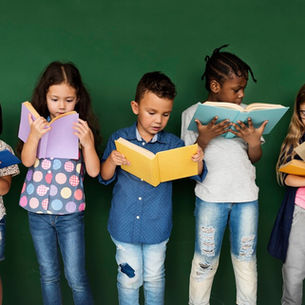The Importance of Humor in Children's Literature
- Rungeen Singh

- Feb 14, 2025
- 3 min read
Updated: 4 days ago
Laughter is universal, crossing barriers of culture and age, and its significance in children's literature cannot be overstated. Humor has a unique way of capturing the attention of young readers, making stories engaging and memorable. Beyond mere entertainment, humor plays a crucial role in a child’s emotional, cognitive, and social development. It is the secret ingredient that transforms books into treasures that children eagerly revisit, shaping their imagination and worldview.

Capturing Young Minds
Children have an innate sense of joy and curiosity, and humor taps into this natural enthusiasm. A funny book draws young readers in, turning reading from a task into a delightful adventure. When stories make children laugh, they become active participants in the narrative, eagerly flipping pages to see what happens next. This engagement fosters a lifelong love for reading, a habit that enriches their intellectual and emotional growth.
Making Complex Topics Accessible
One of the greatest strengths of humor in children's literature is its ability to simplify complex or sensitive topics. Books that use light-hearted approaches to discuss themes like bullying, fear, or diversity help children understand and process these issues without feeling overwhelmed. By softening the gravity of such topics, humor creates a safe space for children to learn and ask questions, promoting open communication and understanding.
Encouraging Creativity and Imagination
Humor often relies on absurdity, surprise, and exaggeration—all of which ignite a child’s imagination. When a giraffe learns to dance or a talking dog solves mysteries, children are encouraged to think outside the box and view the world with curiosity and wonder. This playful approach not only entertains but also nurtures creative thinking, an essential skill in problem-solving and innovation.
Building Emotional Resilience
Laughter is a powerful tool for coping with challenges. Funny stories help children see that mistakes, failures, or awkward moments are part of life and can often be laughed at. This perspective builds emotional resilience, teaching children to approach life’s difficulties with a sense of humor and optimism. A story about a clumsy hero who triumphs despite constant mishaps can inspire children to embrace their own imperfections and keep trying.
Enhancing Social Skills
Shared laughter is a bonding experience, and humorous stories provide opportunities for children to connect with others. Whether it’s reading aloud with family, laughing with friends over a funny book, or reenacting scenes during playtime, these moments foster social interaction and communication skills. Humor also teaches children about timing, tone, and wordplay, helping them develop a nuanced understanding of language.
Humor as a Lifelong Lesson
Children's literature that incorporates humor often leaves a lasting impression. The jokes and amusing situations in these stories become part of a child’s cultural memory, referenced and enjoyed well into adulthood. Classics like Dr. Seuss's whimsical rhymes or Roald Dahl's darkly comic tales continue to captivate readers across generations, proving that humor in children’s books is both timeless and transformative.
Rungeen Singh’s Expertise in Crafting Humor
Mrs. Rungeen Singh, an acclaimed author of over 200 children’s books, masterfully uses humor to engage and educate her readers. Her stories blend humor with meaningful lessons, creating a balance that appeals to both children and their parents. By crafting relatable characters and witty scenarios, she helps children navigate their emotions and experiences with laughter and ease.
Humor in children's literature is far more than a tool for entertainment—it is a bridge to understanding, learning, and growth. It makes books more accessible, lessons more digestible, and memories more cherished. By laughing through stories, children not only learn to see the lighter side of life but also develop the skills and resilience to handle its challenges.
As parents, educators, and writers, embracing humor in storytelling is one of the greatest gifts we can offer to young readers. After all, a book that makes a child laugh is a book that will stay with them forever.



























